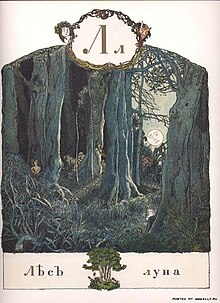
El (Л л or Ʌ ʌ; italics: Л л or Ʌ ʌ) is a letter of the Cyrillic script.
El commonly represents the alveolar lateral approximant /l/. In Slavic languages it may be either palatalized or slightly velarized; see below.
Allography
In some typefaces the Cyrillic letter El has a grapheme which may be confused with the Cyrillic letter Pe (П п). Note that Pe has a straight left leg, without the hook. An alternative form of El (Ʌ ʌ) is more common in Russian, Ukrainian, Belarusian, Bulgarian, Macedonian, and Serbian.
History
The Cyrillic letter El was derived from the Greek letter lambda (Λ λ).
In the Early Cyrillic alphabet its name was людиѥ (ljudije), meaning "people".
In the Cyrillic numeral system, Л had a value of 30.
Forms
El has two forms: one form resembles Greek capital Lambda (Ʌ ʌ), and the other form resembles the Hebrew letter ת (Л л).
Pronunciation
As used in the alphabets of various languages, El represents the following sounds:
- alveolar lateral approximant /l/, like the pronunciation of ⟨l⟩ in "lip"
- palatalized alveolar lateral approximant /lʲ/
- velarized alveolar lateral approximant /ɫ/, like the pronunciation of ⟨l⟩ in "bell" and "milk"
- Labiovelar approximant /w/, like the ⟨w⟩ in "water"
- voiced alveolar lateral fricative /ɮ/ and its palatalized equivalent /ɮʲ/
The /l/ phoneme in Slavic languages has two realizations: hard (, [ɫ], or , exact pronunciation varies) and soft (pronounced as ) – see palatalization for details. Serbian and Macedonian orthographies use a separate letter Љ for the soft /l/ – it looks as a ligature of El with the soft sign (Ь). In these languages, ⟨Л⟩ denotes only hard /l/. Pronunciation of hard /l/ is sometimes given as , but it is always more velar than in French or German.
Slavic languages except Serbian and Macedonian use another orthographic convention to distinguish between hard and soft /l/, so ⟨Л⟩ can denote either variant depending on the subsequent letter.
The pronunciations shown in the table are the primary ones for each language.
| Language | Position in alphabet |
Pronunciation |
|---|---|---|
| Belarusian | 13th | /ɫ/, /lʲ/ |
| Bulgarian | 12th | /w~ɫ/, /l/ |
| Kazakh | 16th | /ɫ~l/ |
| Macedonian | 14th | /l/ |
| Mongolian | 13th | /ɮ/, /ɮʲ/ |
| Ossetian | 16th | /ɫ~l/ |
| Russian | 13th | /ɫ/, /lʲ/ |
| Serbian | 13th | /l/ |
| Ukrainian | 16th | /ɫ/, /lʲ/ |
In addition, л was formerly used in Chukchi to represent the voiceless alveolar lateral fricative /ɬ/ but has since been replaced by ԓ.
Related letters and other similar characters
- Λ λ : Greek letter Lambda
- Љ љ : Cyrillic letter Lje
- Ӆ ӆ : Cyrillic letter El with tail
- Ԓ ԓ : Cyrillic letter El with hook
- Ԯ ԯ : Cyrillic letter El with descender
- L l : Latin letter L
- Ł ł : Latin letter L with stroke
- ת : Hebrew letter Taw
Computing codes
| Preview | Л | л | ||
|---|---|---|---|---|
| Unicode name | CYRILLIC CAPITAL LETTER EL | CYRILLIC SMALL LETTER EL | ||
| Encodings | decimal | hex | dec | hex |
| Unicode | 1051 | U+041B | 1083 | U+043B |
| UTF-8 | 208 155 | D0 9B | 208 187 | D0 BB |
| Numeric character reference | Л |
Л |
л |
л |
| Named character reference | Л | л | ||
| KOI8-R and KOI8-U | 236 | EC | 204 | CC |
| Code page 855 | 209 | D1 | 208 | D0 |
| Code page 866 | 139 | 8B | 171 | AB |
| Windows-1251 | 203 | CB | 235 | EB |
| ISO-8859-5 | 187 | BB | 219 | DB |
| Macintosh Cyrillic | 139 | 8B | 235 | EB |
Use in mathematics
El is sometimes used to represent the Clausen function, and if not, the capital greek letter Lambda is.
External links
References
- Corbett, Professor Greville; Comrie, Professor Bernard (September 2003). The Slavonic Languages. Routledge. ISBN 978-1-136-86137-6.
